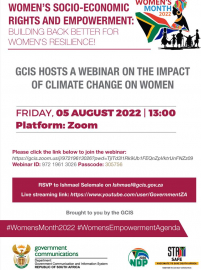
South African women have been challenged to take part in conversations aimed at finding solutions to mitigate the impact of climate change.
Member of the Presidential Climate Change Commission, Princess Tsakani Nkambule, said women must be at the centre of decision making because they endure the most of the adverse effects of climate change.
“As women, we need to prepare [ourselves] on how we will be impacted by this climate change conditions, [and] how do we adjust our businesses in our environment to respond to the impact of climate change.
“Women in South Africa, especially women in rural areas are vulnerable and at the worst conditions. Women, children and the unemployed form part of society that need to ensure that during transition they are not left behind,” Nkambule said on Friday.
Nkambule was speaking at a webinar on the impact of climate change on women.
The webinar, hosted by the Government Communication and Information System (GCIS) as part of Women’s Month celebrations, provided a conversational space for women to reflect on the unique ways in which they are impacted by climate change, including ways in which different industries can adapt their operations to respond to the effect of climate change.
WATCH | 
Nkambule noted that the country is pursuing an energy mix that includes renewables.
“As women where are we? How do we participate in this environment, how do we transform our businesses as we are operating today and move towards the green economy? How do we ensure that in our environment there’s upskilling to allow us to participate in this economy?”
Farmer Thandiwe Mchunu, from Amahlongwa near Umkomaas, on the KwaZulu-Natal south coast, insisted that there is no need to take organic waste to landfills.
Instead, she said, households can use their vegetable peels.
“What we need to do, even at household level, whenever you are in the kitchen peeling that onion, or just eating your banana or orange, do not take the peels to the bin. We are turning food waste into fresh food, we have the skills and strength [and] even support from our communities and families. Ours is to access the market to grow from small scale to big scale farmers,” Mchunu said.
She also admits that while there is plenty of land in rural areas to be used for farming, it is not easy for women to access it.
“Everyone needs to come into [the] economic war and fight to enter the space, whether you are in rural areas or in the township, you need to be able to ask yourself what are you contributing to mitigate climate change,” Mchunu said.
Mchunu, who is currently studying towards a Master’s Degree in Chemical Engineering, also noted that South Africa has many women graduating in engineering, even in the Science, Technology, Engineering, and Mathematics (STEM) areas. She said these are change maker careers that can come up with solutions to address climate change.
Just Energy Transition Framework
Last month, the Presidential Climate Committee (PCC) presented the Just Energy Transition (JET) Framework to President Cyril Ramaphosa, which will serve as a key evidence-based guide for policy making for South Africa’s transition from a carbon intensive economy towards a greener and cleaner economy.
President Ramaphosa said as the framework underscores, combating climate change is not only an environmental imperative, but an economic one as well.
“This framework is an evidence-based document and a victory for evidence-based policymaking. The publication of this framework must now serve as a call to action to each of us to embrace the opportunities presented by a low-carbon, inclusive, climate resilient economy and society,” the President said at the time.
The PCC has held stakeholder engagements, community dialogues and colloquiums in a bid to conduct robust research and analysis and hear views on South Africa’s transition in a bid to leave no one behind. – SAnews.gov.za


